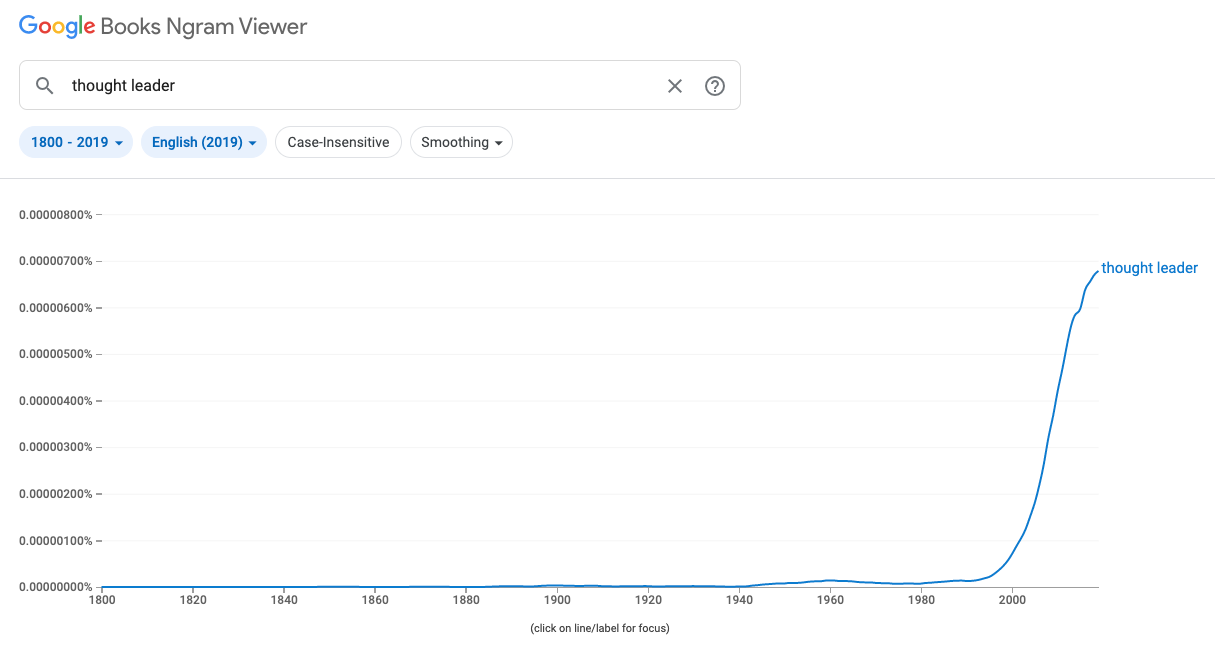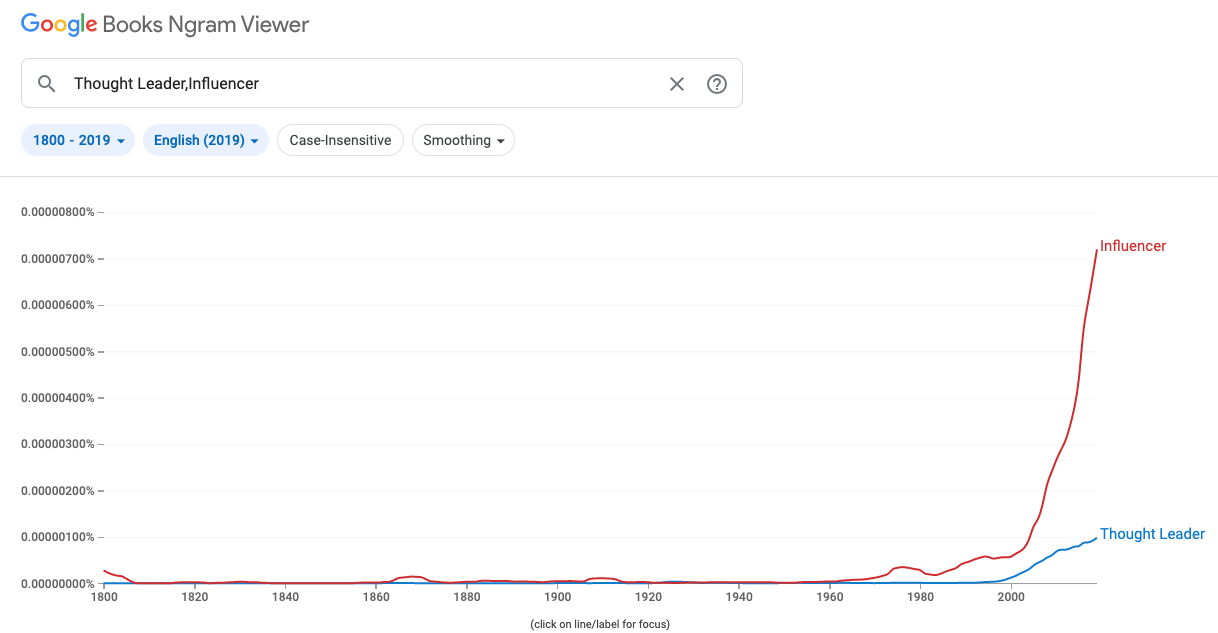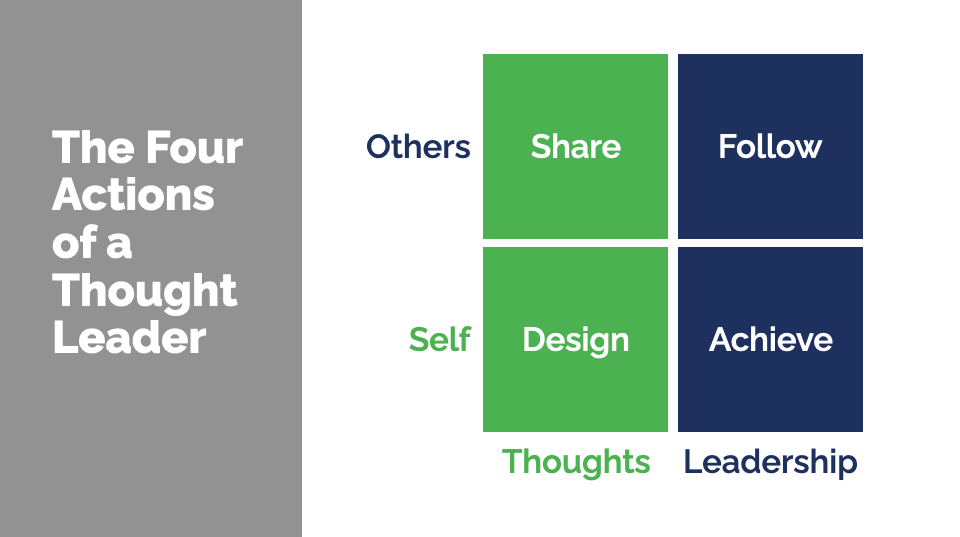Definitions of Thought Leadership: What is a thought leader?
What is a Thought Leader?
Prior to 1990, the term ‘thought leader’ was not widely used. And then suddenly ‘thought leaders’ started appearing everywhere. First in books, then in conversations, it’s now a search term on Google and business experts are branding themselves in ‘thought leadership’.
But is being a thought leader good for your career and business?
To answer that question, we need to consider:
- What are the definitions of Thought Leadership?
- Synonyms for Thought Leader – what other words might we use?
- The need for Thought Leadership
- Thought Leadership Meaning? What does it mean to be a Thought Leader – and how do you become one?
- The three key trends driving the rise of Thought Leadership
To kick things off let’s look at Thought Leader Meaning and Definition
Definitions of Thought Leadership
Let’s start with our definition: What is a Thought Leader?
The literal definition of a Thought Leader is ‘someone who leads with ideas’.
It follows a literal definition of thought leadership is: ‘the consistent and deliberate practice of leading with ideas.’
For this to be useful we need to understand how they do this.
Traditional leadership uses a command and control style. Essentially, this means you tell people what to do. Think military.
To lead with your ideas, you need a different approach. Fresh ideas present choices or alternatives.
For example, if you were wanting to buy a new mobile phone but didn’t know which one to buy then you might ask your friend, George. He is the person that everyone you know asks about which phone to buy. It’s this reputation that makes George a thought leader in the area of ‘buying a new phone’. He has a special set of knowledge or way of looking at the world, such that his ideas or advice can help you.
Why Thought Leadership is important
As I mentioned at the top of this article, the term ‘thought leadership’ emerged in the 1990s. So why did this happen? And why is thought leadership important?
I think the big trend here is the fragmentation of authority in our society. Previously, we turned to our governments, our church, our educators and the media to tell us what was happening in the world and how to respond. We trusted them as leaders to guide us in our lives and in our work. But the rise in information and ultimately the birth of the Internet and social media has many instead of a handful of tried and trusted sources of information we now had hundreds and thousands of sources. (Ultimately, with social media you might say we now have billions of opinions.) Given this flood or sources, we then needed to turn to another group of people to make sense of all of this – thus the rise of thought leadership.
Thought Leadership is important because we need people to guide our thinking and our actions. And in the era of content saturation, social media and fake news, this is more crucial than ever.
Synonyms for Thought Leader
In providing definitions of thought leadership, it’s help to look at similar words. A synonym is a word that has a similar meaning. What are some of the words that have similar meanings for ‘thought leader’?
- Authority – An authority is someone who has a powerful influence. It might be because you are the boss so you have authority by your position. On, in the case of a thought leader, you have authority in your area of expertise meaning people listen to your opinion and what you have to say. Also, you might notice the word ‘author’ in here. Being an author of a book or a body of work is traditionally a powerful way to be a thought leader.
- Trust Agent – In 2009, Chris Brogan and Julien Smith wrote a book titled ‘Trust Agents – Using the web to build influence, improve reputation and earn trust’. They were pointing to the people who had jumped online to create new things and help us make sense of the world. They built social capital based on what they published and the foundation of this was trust. This is a great alternative description of a ‘thought leader’.
- Innovator, Pioneer or Trailblazer – these are general words that hint at someone who does new things. While they can apply to thought leaders, they don’t include the vital aspect of ‘thoughts’ or ‘ideas’. For instance, a pioneer traditionally meant someone who lived in a new region. An innovator maybe someone who has original ideas, but it may also be someone who builds new technology but doesn’t distinguish or share their thoughts about this. For example, I’d put Elon Musk in this category. He’s great at building new things but he doesn’t tend to lead the conversation about them, rather he lets his creations do the talking for him. (Perhaps there is a different view here also – that you can lead with your ideas by building things. It begs the question: does a thought leader have to talk about what they do to lead with their ideas? Perhaps not.)
- Leading with your ideas – This is a literal interpretation for a thought leader. Ideas are a form of thoughts and if you’re leading with your ideas you’re a thought leader.
- Influencer – see below. Definitely, an overlap here but not every influencer is also a thought leader.
Is a Thought Leader an Influencer?
A simple way to look at this is to compare the terms ‘thought leader’ and ‘influencer’.
Simply put, a thought leader is an influencer. This is important to connect these terms.
Google Books Ngram Viewer measures the word usage of specific terms in books over time. (Note: The data only goes to 2019.)
In the first example, we can see the dramatic rise of the term Thought Leader around 1990.
However, if we compare this to the term Influencer, we can see that they both grew in terms of usage at about the same time. Yet, while Thought Leader has stayed relatively small, Influencer has grown dramatically in usage.
This suggests that Influencer is the broad category, and Thought Leader is a specific type of Influencer.
For instance, while we would call a food blogger an influencer, we may be less likely to call them a thought leader. I think the difference is that a Thought Leader has frameworks, models and insights that change how we see the world. In contrast, an influencer like a food blogger may have a lot of great recipes, but they’re not really changing how we see the world.
Typically, a ‘thought leader’ is either a business term or an academic one. In business, a Thought Leader is an industry or subject matter expert. Thought Leaders can work inside organisations or independently as consultants or solo entrepreneurs. In academia, a Thought Leader is someone who presents new ways of looking at things – they lead their field with their thoughts.
One way of saying what a Thought Leader does is that they lead conversations about how things could be.
What’s driving the need for Thought Leadership?
Given that Thought Leadership is a relatively new term, where did it come from? I think there are three strong trends that are driving the rise of Thought Leadership.
1 Work
The first trend driving thought leadership is how work has changed. The big shift here is to knowledge work.
Several hundred years ago most workers in the Western world were on farms. They grew crops and tended animals. Then we had the Industrial Revolution where most workers worked in factories with machines. And over the past one hundred years, especially the past 50 years, the majority of people now work in offices.
Our work is no longer physical, it’s now mental. For most of us our work now happens in our heads and through our conversations. This is a shift from hands (the word manufacture comes the latin word ‘manual’ meaning hands) to our brains or our thoughts.
And given we now think for a living, we need people to turn to for those big ideas. These people are the thought leaders.
2 Leadership
The second trend driving thought leadership are the changes in leadership itself.
Traditionally leadership was based on the military with a boss telling people what to do. This made sense when information was limited. One person could know enough to command others. But now with knowledge work and the rising complexity of the world in which we live, this doesn’t make sense.
Today, no one knows everything that needs to be known. It’s no longer the knowledge that makes the difference but how we work together. This is what most leaders focus on most of the time – how to get things done. You most likely don’t also have the time and attention to put in the effort to also come up with new and innovative ideas.
A thought leader is that subset of leaders who specialise on thinking about how to do things in new and better ways. They do the thinking for us to show us where the opportunities are and how to fulfil them.
3 Social Media
The third trend driving thought leadership is the rise of social media.
In the past, knowledge sources were limited. In a small town, the most educated and most knowledgeable people were the schoolteacher, the church leader or the doctor.
Beyond them, we relied on mass media, (newspapers, radio and television) to tell us what was happening in the world. These were respected sources of knowledge. They were the authorities that we turned to, to tell us what was happening and what we should do.
Now, thanks to the Internet, instead of a handful of sources of information, we have millions of sources of information across websites and social media.
Inside this context, the challenge is to find people we can turn to as trusted sources of knowledge and information. These are our thought leaders.
Summary of Three Trends driving Thought Leadership
To summarize, being a thought leader reflects three big trends
- Most of us do knowledge work and that knowledge must be sourced from somewhere and someone
- Most leaders are so heavily focused on getting things done, they don’t have time to think about innovation and new opportunities. This is where thought leaders can help.
- In the world of social media, we need reliable sources of ideas from people with authority. These are the thought leaders.
Meaning: What is a Thought Leader?
Thought Leader Meaning: What does it mean to be a thought leader?
More specifically, how do you become a thought leader – what actions would you take?
As per our previous definition of ‘leading with ideas’, let’s look at those two parts.
Becoming a Leader
Let’s start with leadership. There are two pieces here.
Warren Bennis in his classic book, On Becoming A Leader, suggests that leadership begins when we set out to achieve something. We say ‘I’m going to make this happen’. That’s the first step.
The second step occurs when people are curious or inspired by the actions that we take such that they want to follow us in some way. This might be to join us on our quest, to watch us on social media or to try their own version of what we’re doing.
This gives us two actions:
- Set out to achieve something
- Have people follow in some way
In this post, we can see these two actions in play. I’ve set out to share my thoughts on thought leadership and you’re following along by reading it.
Sharing Thoughts and Ideas
Now, let’s look at the thoughts or ideas side of things. There are two pieces here also.
During our day-to-day life, we have lots of experiences. By themselves, they are just that – things that happen to us. To be a thought leader we need to translate what happens to us into some meaning and learning for other people.
The two steps here are to:
- Design or arrange our thoughts in a way that they may be valuable to others – turn your insights into IP.
- Share your thoughts so others can engage with them.
In this post, I’ve arranged my thoughts into this diagram to make it easier for you to grasp the key concepts. Plus, I’ve shared this here on my blog and on YouTube so you can engage with it.
Thus, the four actions of a thought leader that explain what it means to be a thought leader based on how you become one.
Summary: Definitions of Thought Leadership
Let’s wrap up what we’ve covered here.
The simple definition of a thought leader is someone we listen to for their thoughts and ideas.
And a simple definition of thought leadership is the consistent and deliberate practice of sharing your thoughts and ideas.
Three trends driving the rise of the Thought Leader are:
- A shift from physical work to knowledge work
- The need for leadership around the latest thinking
- A demand for reliable sources of knowledge in an era of social media.
Thought Leader Meaning and what it means to be a Thought Leader is based on four actions:
- Achieve – Leaders set out to make something happen
- Follow – Allow people to join in your quest
- Design – Arrange your thoughts so others can learn from them
- Share – Make what you have learnt available for others
Is being a Thought Leader good for your career or business?

One of the thought leaders I follow is Cal Newport. He’s written several books that I love and one of his books I selected as my book of the year in 2016. It’s called Deep Work.
Essentially, Cal splits work in two – shallow work and deep work.
- Shallow work is the kind of work that most of us do without a lot of concentration and thinking. It’s emails, meetings and logistical tasks.
- Deep Work is thinking intensely on issues that matter. This includes strategic thinking, coming up with fresh ideas and learning new skills. Deep work is valuable because it can make a big difference. Also, so few people actually do it. This is the work that a Thought Leader would do.
Being a thought leader is good for your career or business provided you do two things.
- You do deep work thinking about important issues.
- You share what you know with others
To be successful as an expert in business it’s not just what you know that makes you an expert or a thought leader, it’s who knows that you know.
More on Definitions of Thought Leadership
To read more or watch more on thought leadership meaning:
- How to be successful as an expert in business
- Build Your Business Expertise – Three powerful ways
- Content Marketing Strategy – Share what you know









